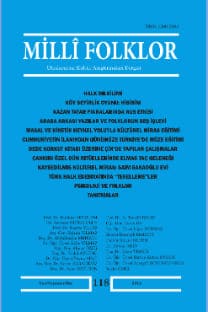Uses and functıons of Turkish folk music in present-day Turkey
Türkiyede Türk halk müziğinin günümüzdeki kullanımları ve işlevleri
___
- A., T. Personal Interview. 21 June 2011.
- A., Z. Personal Interview. 8 July 2011.
- Aşık Kulfani. Personal Interview. 30 June 2011.
- B. Personal Interview. 10 June 2011.
- Bayart, Jean-François. The Illusion of Cultural Identity. London: Hurst & Company, 2005. Print.
- Born, Georgina, and David Hesmondhalgh. Western Music and Its Others: Difference, Representation, and Appropriation in Music. University of California Press, 2000. Print.
- Bryant, Rebecca. The Soul Danced Into The Body: Nation And Improvisation In Istanbul. American ethnologist 32.2 (2005): 222238. Print.
- Ç., H. Personal Interview. 18 June 2011.
- Ç., M. Personal Interview. 7 July 2011.
- Ç., O. Personal Interview. 24 June 2011.
- D., Ç. Personal Interview. 3 July 2011.
- D., E. Personal Interview. 21 June 2011.
- E., B. Personal Interview. 21 June 2011.
- E., P. Personal Interview. 6 June 2011.
- E., Y. Personal Interview. 16 June 2011.
- Erol, Ayhan. Reconstructing Cultural Identity in Diaspora: Musical Practices of the Toronto Alevi Community. Music from Turkey in the Diaspora. Vienna: Institut für Volksmusikforschung und Ethnomusikologie, 2008. 151161. Print. Klanglese 5.
- Frith, Simon. Music and Identity. Questions of Cultural Identity. Ed. Stuart Hall and Paul Du Gay. London: Sage, 1996. 108127. Print.
- Greve, Martin. Almanyada Hayali Türkiyenin Müziği. Istanbul: Bilgi Üniversitesi Yayınları, 2006. Print.
- Güney, Serhat, Cem Pekman, and Bülent Kabaş. Diasporic Music in Transition: Turkish Immigrant Performers on the Stage of Multikulti Berlin. Popular Music and Society 37.2 (2014): 132151. Web. 19 Dec. 2012.
- Hall, Stuart. Cultural Identity and Diaspora. Theorizing Diaspora: A Reader. Oxford: Blackwell Publishing, 2003. 233246. Print.
- Hall, Stuart. Introduction: Who Needs Identity? Ques- tions of Cultural Identity. Ed. Stuart Hall and Paul Du Gay. London: Sage, 1996. 117. Print.
- Hall, Stuart, and Paul Du Gay, eds. Questions of Cultural Identity. London: Sage, 1996. Print.
- Hemetek, Ursula, and Hande Sağlam, eds. Music from Turkey in the Diaspora. Vienna: Institut für Volksmusikforschung und Ethnomusikologie, 2008. Print. Klanglese 5.
- K., M. Personal Interview. 10 June 2001.
- K., Ş. Personal Interview. 6 June 2011.
- K., Z. Personal Interview. 30 June 2011.
- Karahasanoğlu, Songül, and Gabriel Skoog. Synthesizing Identity: Gestures of Filiation and Affiliation in Turkish Popular Music. Asian Music 40.2 (2009): 5271. Print.
- Ko., N. Personal Interview. 26 June 2011.
- Kö., N. Personal Interview. 23 June 2011.
- M. Personal Interview. 24 June 2011.
- Merriam, Alan P., and Valerie Merriam. The Anthropology of Music. Evanston, Illinois: Northwestern University Press, 1964. Print.
- Nettl, Bruno. The Study of Ethnomusicology: Thirty-One Issues and Concepts. New edition. Urbana and Chicago: University of Il-linois Press, 2005. Print.
- Nketia, J.H. Kwabena. Contextual Strategies of Inquiry and Systematization. Ethnomusicology 34.1 (1990): 7597. Print.
- O., B. Personal Interview. 22 June 2011.
- O., H. Personal Interview. 7 July 2011.
- Ozan Efsani. Personal Interview. 30 June 2011.
- Ş., Y. Personal Interview. 25 June 2011.
- Scott, Helen. What Is Grounded Theory? - Grounded Theory Online; Supporting GT Re- searchers. N. p., 2009. Web. 18 Nov. 2013.
- Sels, Liselotte. Müzik Ruhun Gıdası | Muziek Is Voedsel Voor de Ziel: Etnografisch Onderzoek Naar Het Gebruik En de Functies van Turkse Volksmuziek in Gent. Volkskunde 114.1 (2013): 124. Print.
- Stokes, Martin. Place, Exchange and Meaning: Black Sea Musicians in the West of Ireland. Ethnicity, Identity, and Music: The Musical Construction of Place. Ed. Martin Stokes. Berg Publishers, Incorporated, 1994. 97 115. Print.
- Stokes, Martin. The Arabesk Debate: Music and Musicians in Modern Turkey. Oxford: Clarendon Press, 1992. Print. Oxford Studies in Social and Cultural Anthropology.
- Stone, Ruth M. Let the inside Be Sweet: The In- terpretation of Music Event among the Kpelle of Liberia. Indiana University Press, 1982. Print.
- T., O. Personal Interview. 9 June 2011.
- Thomas, David R. A General Inductive Ap- proach for Qualitative Data Analysis. American Journal of Evaluation 27.2 (2006): 237246.
- Ustuner, Tuba, Guliz Ger, and Douglas B. Holt. Consuming Ritual: Reframing the Turkish Henna-Night Ceremony. Advances in Consumer Research 27 (2000): 209214. Print.
- Uzun, Erol. Personal Interview. 6 July 2011.
- Van Maanen, Hans. How To Study Art Worlds: On The Societal Functioning Of Aesthetic Values. Amsterdam: Amsterdam University Press, 2010. Print.
- Y., A. Personal Interview. 6 June 2011.
- ISSN: 1300-3984
- Yayın Aralığı: 4
- Başlangıç: 1989
- Yayıncı: Geleneksel Yayıncılık Eğitim San. Tic. Ltd. Şti.
Türk atasözlerinde iklim algısı ve coğrafya
Kendini seyreden öteki: halk kültürü temsillerinde öz oryantalist yaklaşımlar
Halk anlatılarında kuyunun işlevselliği üzerine bir okuma
Kültürel bellek aktarıcısı olarak ninni
Türk halk kültürünün yerel mimari mirası arı serenleri
Somut olmayan kültürel mirasın geleceği Türkiye deneyimi
Mutfak kültürünün geleneksel Diyarbakır evlerine sosyal ve mekânsal yansımaları*
Havva ÖZYILMAZ, İCLAL ALUÇLU, CAN TUNCAY AKIN
Siirt halk kültüründe kutsal ağaç ve türbeler
